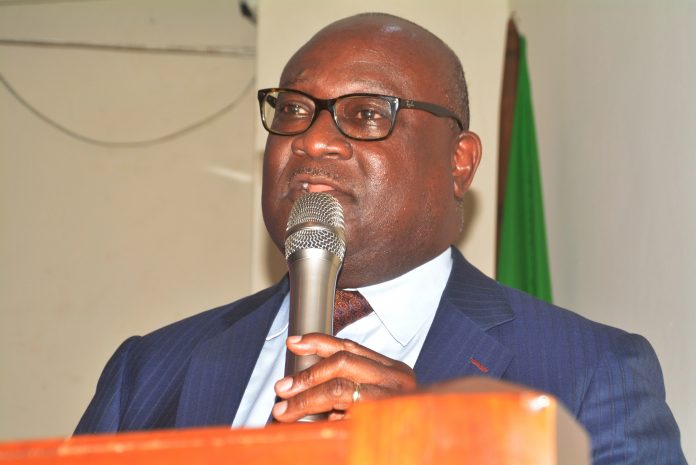A speech delivered at Marketing Edge National Marketing Summit in Lagos as chairman’s of the occasion by former Chairman Advertising Practitioners Council of Nigeria/GMD, SO&U, Mr. Udeme Ufot.
We live in a fast changing and transforming world. Innovations are taking place at the speed of light. This is an age of continuous learning where nothing is guaranteed, except change and surprises.
The key marketing paradigms have been seriously challenged or transformed, sometimes in ways we never imagined. Product design, channels of distribution, communications platforms, pricing techniques and even market segmentation approaches have undergone rapid transformation and are constantly being transformed.
The classical concept of the four Ps of Product, Price, Production, Place have acquired new meaning in the context of the new world. This is further compounded when extended to the eight Ps that include People, Processes, Physical Evidence and Performance.
Regis Mckenna, Chairman of Regis Mckenna Incorporated, in an article “Marketing is Everything” notes that “Marketing’s transformation is driven by the enormous power and ubiquitous spread of technology. Technology is transforming choice, and choice is transforming the market place.
As a result, we are witnessing the emergence of a new marketing paradigm- not a “do-more” marketing that simply turns up the volume on the sales spiels of the past, but a knowledge and experience based marketing that represents the once- and – for all death of the salesman”.
A key outcome of this transformation is the tremendous empowerment of the consumer. The notion that the customer is king has been replaced with a new perspective of the customer as god- all powerful, all knowing, and highly mobile.
Marketing is acquiring a very nebulous nature where the marketer is spoilt for choice when it comes to opportunities for consumer engagement but yet hugely challenged by loss of control of what the consumer sees or hears.
At the click of a button, the consumer can have virtually whatever information he needs, even those he does not seek are thrust before him.
At the click of a button, he can transport himself to any market he desires, compare offerings, and negotiate the best deals for himself. If he is unhappy with the service he has received, or disappointed with the performance of your brand, he can spread the word globally in a matter of seconds.
Today’s consumer not only receives information, he is a disseminator of information, and co-creator of the brand.
Today’s consumers can contribute to building your brand into the most loved and trusted in its category, and can also destroy your brand in seconds. The consumer has become a communication vehicle and given“word of mouth” a new dimension I can describe as “word of finger”.
The customer has transformed into a most unexpected and powerful creature, one that you offend at great peril to your brand.
The forces driving the Digital Age and leading to this transformation have been identified as:
- Digitalization and connectivity
- Explosion of the internet
- Customization and customerisation
- New types of intermediaries
- A new generation of young, active digital natives
The digital age is the age of democratized information and interconnectivity through digital devices.
In Nigeria’s emerging market, despite the fact that we are yet to attain 100% connectivity, increased teledensity and ease of access to smart phones coupled with the crash in cost of data has put a lot of power at the fingertips of the consumer.
According to Bill Gates in his book The Road Ahead,“one thing is clear. We don’t have the option of turning away from the future. No one gets to vote on whether technology is going to change our lives”. We are all passengers on this Digital train, we must adapt or derail.
According to Renee Mauborgne and W. Chan Kim in the expanded edition of their bestselling book, Blue Ocean Strategy, “gone are the days when organisations and institutions could control a large proportion of information disseminated to the public on their products, services and offerings… today, the surge in social network sites, blogs, micro-blogs, video sharing services, user generated content etc. across the globe have shifted the power and credibility of voice from the organisation to the individual”.
Trendwatching.com, a global Consumer Trends and Insight Research Company in its October 2017Trends Report characterised the Digital Age as the Age of Radical Transparency.
According to the Report:
“A business used to be a black box. It was pretty hard to see what was going on inside. The brand that the business showed the world was whatever you painted on the outside of the box. People came and looked at it. They either liked it, or they didn’t.
In today’s world, a business is a glass box. Outsiders can easily see inside. They can see the people and the processes. They can see the values. They can even see what the people inside the box feel about what they are doing. You already intuitively know the reason for that profound change”.
We can all recall the case of United Airlines last year when a passenger was dragged of the plane in the United States. It went viral in a matter of minutes through passengers’ mobile phones and caused a global outrage.
Brand equity and reputation built over years was in shreds.
The company’s stock price was also not exempted from the heat.
It is important at this juncture to note that we are here to discuss marketing in the Age of Digitalisation, and not necessarily Digital Marketing, or all of the techniques and terminologies of digital Marketing.
It is about taking a deeper look at how we practice marketing through all the various stages, from ideation through to our strategy, internal processes and systems to implementation in order to effectively communicate, connect with and profitably satisfy the needs and desires of customers in the Digital Age.
This summit is not about digital as a platform, it is more about consumers and how they are thinking, acting, expressing themselves and connecting with one another in the Digital Age. It is about how we can leverage that understanding to better engage and relate with them.
To my Agency colleagues, we must note and familiarize ourselves with these transformations in the marketing space and be prepared and equipped to effectively lead our clients through the Digital maze.
Anything less will mean a loss of relevance.
Udeme Ufot, former APCON Chairman












































